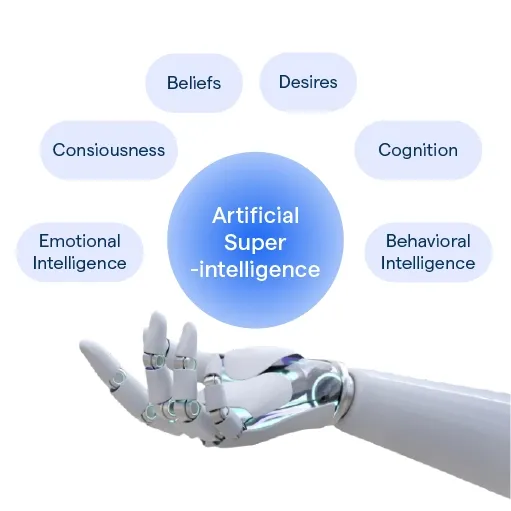What is Artificial Superintelligence?
Artificial Superintelligence refers to a potential future form of artificial intelligence (AI) that surpasses human intelligence in virtually all economically valuable work.
This means an artificial superintelligence could outperform humans in most economically valuable activities, including scientific creativity, general wisdom, and social skills. It's not just about raw computational power, but also about things like being better at learning, decision-making, problem-solving, and possessing common-sense reasoning.
The development of artificial superintelligence could lead to significant societal shifts as its capabilities would be beyond human control and understanding. However, it remains a theoretical concept and a topic of active debate among AI researchers.
Capabilities of Artificial Superintelligence
Unrivaled Problem Solving
Artificial superintelligence would possess problem-solving skills beyond human capacity, capable of devising innovative solutions to address complex global issues like famine, pollution, and disease.
Accelerated Knowledge Acquisition
Superintelligent AI could rapidly learn and understand new concepts, outpacing the collective intelligence of humanity. It could potentially master all human and scientific knowledge sooner than any human could.
Exceptional Creativity
By processing a vast array of data and concepts, a superintelligent AI could produce groundbreaking ideas in art, design, and innovation, pushing creative boundaries far beyond human imagination.
Predictive Proficiency
Superintelligence would have the ability to analyze patterns and predict future events with remarkable accuracy. It could forecast trends in finance, climate change, or human behavior, enhancing decision making in these areas.
Enhanced Autonomy and Efficiency
With its superior cognitive abilities, superintelligence could independently perform tasks quicker and more efficiently than humans, contributing to major advancements in numerous sectors, from manufacturing to healthcare.
The Benefits of Artificial Superintelligence
Accelerated Scientific Discoveries
Artificial Superintelligence (ASI) could significantly boost scientific research by processing vast amounts of data, identifying patterns, and generating valuable insights, leading to faster discoveries and breakthroughs.
Improved Medical Diagnostics and Treatment
ASI has the potential to revolutionize healthcare by accurately diagnosing diseases, recommending personalized treatments, and even discovering new drugs, ultimately enhancing patient outcomes and quality of life.
Enhanced Decision-Making and Problem Solving
With superior thinking and problem-solving capabilities, ASI could help organizations and governments make data-driven, optimal decisions, leading to improved efficiency and effectiveness across various industries.
Automation of Complex Tasks
ASI could automate complex tasks that currently require human expertise, freeing up time for individuals to focus on creative, collaborative, and emotionally engaging endeavors, effectively transforming the workforce.
Tackling Global Challenges
By leveraging its unparalleled problem-solving abilities, ASI could help address pressing global issues, such as climate change, poverty, and resource allocation, paving the way for a safer and more sustainable future.
The Risks of Artificial Superintelligence
Surpassing Human Intelligence
Artificial Superintelligence, by definition, surpasses human abilities in virtually all economically valuable work. This raises concerns about humans losing control over these superintelligent machines, leading to unpredictable consequences.
Ethical and Moral Dilemmas
Machines lack human emotions and moral judgement. If a superintelligent AI makes decisions that affect humans, differences between human morality and AI's decision-making mechanisms could lead to problems.
Job Displacement
The rise of superintelligent AI might render many jobs obsolete, leading to unemployment and social instability. As these machines outperform humans, a substantial portion of the workforce may need to be re-skilled or up-skilled.
Security Concerns
Superintelligent AIs could be used maliciously if they fall into the wrong hands. This could lead to new types of cyber-attacks or even physical destruction if the AI has control over certain infrastructure.
Singularitarian Risks
In the singularity concept, superintelligence might make rapid self-improvements, leading to an intelligence explosion. The outcomes could be unpredictably harmful if not adequately controlled or aligned with human values.
The Possibility of Human-like Artificial Intelligence
Progress Towards Human-like AI
Advancements in AI have already given rise to machines that can replicate certain human attributes. We have chatbots that can engage in natural language conversations and computer vision systems that can recognize objects with impressive accuracy. However, reaching the level of true human-like intelligence is still a work in progress.
Surpassing Human Intelligence?
The big question on everyone's mind is whether Artificial Superintelligence will surpass human intelligence. While it's difficult to predict the future with certainty, some experts believe that it's a possibility. If that were to happen, it would undoubtedly reshape the world as we know it.
Understanding the Impact on Society and People
As we're already witnessing, Artificial Superintelligence is starting to impact our society in various ways. Let's take a closer look at some key areas.
Impact on Employment
The rise of AI, including Artificial Superintelligence, raises concerns about the future of work. Jobs that were once performed by humans might be automated, leading to workforce displacement. However, it's important to remember that new opportunities and roles may also emerge as technology evolves.
Impact on Healthcare
In the field of Healthcare, AI is already making waves. Artificial Superintelligence can revolutionize diagnosis accuracy, drug discovery, and personalized treatment plans. It has the potential to enhance healthcare outcomes and improve patient care, ultimately saving lives.
Impact on Finance
Artificial Superintelligence could have a significant impact on the financial sector. Its ability to process vast amounts of data at lightning speed can lead to more accurate risk analysis, fraud detection, and intelligent investment strategies. This could potentially transform the way we manage and interact with our finances.
The Future of AI
So, what does the future hold for AI? Let's explore some exciting possibilities.
The Next Generation of AI
As we continue to push the boundaries of AI, the next generation might bring us even closer to Artificial Superintelligence. We can expect more sophisticated algorithms, enhanced learning capabilities, and refined decision-making processes. The future is brimming with potential.
Changing Our World
With the advent of Artificial Superintelligence, our world could undergo a profound transformation. We might witness breakthroughs in healthcare, solve complex global problems, and experience unprecedented advancements in various fields. The possibilities are vast, and the impact could be revolutionary.
Frequently Asked Questions

What is the difference between AGI and ASI?
Artificial General Intelligence (AGI) refers to machines with human-level intelligence, while Artificial Superintelligence (ASI) surpasses human intellectual capabilities in all aspects.
When can we expect ASI to be developed?
Predicting an exact timeline for ASI development is challenging, as it's a theoretical concept and depends on future advancements in AI research and technology.
How might ASI impact the job market?
ASI could potentially outperform humans in most tasks, leading to job displacement and requiring workforce adaptation to new industries and roles.
What are safety concerns surrounding ASI?
ASI raises concerns about control, decision-making, and ethical considerations, as its capabilities might surpass human understanding, making it difficult to ensure alignment with human values.
How can researchers ensure ASI benefits humanity?
Researchers can focus on developing AI safety measures, long-term value alignment, and ethical guidelines, ensuring that ASI serves humanity's best interests, rather than posing risks.

